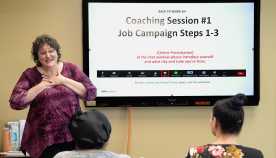About Us


Social isolation is more than feeling lonely. It’s the result of feeling disconnected from support groups of family, friends and community. What's more, it can have a negative impact on your physical and emotional health.
AARP Foundation Connect2Affect
The good news is there are simple things you can do, like learning how to build social connections. Research consistently shows that having social connections can help you experience fewer mental and physical health issues as you grow older.
AARP Foundation created Connect2Affect to make it easy to find all the information you need in one place — from tips on how to make new friends to using the latest technology to foster relationships.
Are You Experiencing Social Isolation? You’re Not Alone.
In 2023, according to the University of Michigan National Poll on Healthy Aging, 1 in 3 adults age 50–80 (34%) reported feeling isolated from others in the past year. And more than 1 in 3 older adults (37%) reported feeling a lack of companionship.
Connect2Affect can help you understand your risk level and what you can do to overcome social isolation. You'll find tips on staying connected to your community and other helpful resources. Some of the topics covered include:
- Meeting new people and making friends
- Spotting scams when connecting online
- Coping with grief or loss
- Connecting with your community through volunteer opportunities
Connect2Affect can help you to build social connections and find your way back to a fuller life.

















